This post may contain affiliate links. Please read our disclosure policy.
Update: This post, “Ready for Kindergarten?” was first shared here several years ago, but as parents are thinking about sending their children to Kindergarten in the fall, I wanted to reshare it today. These skills will help your child adapt to Kindergarten…
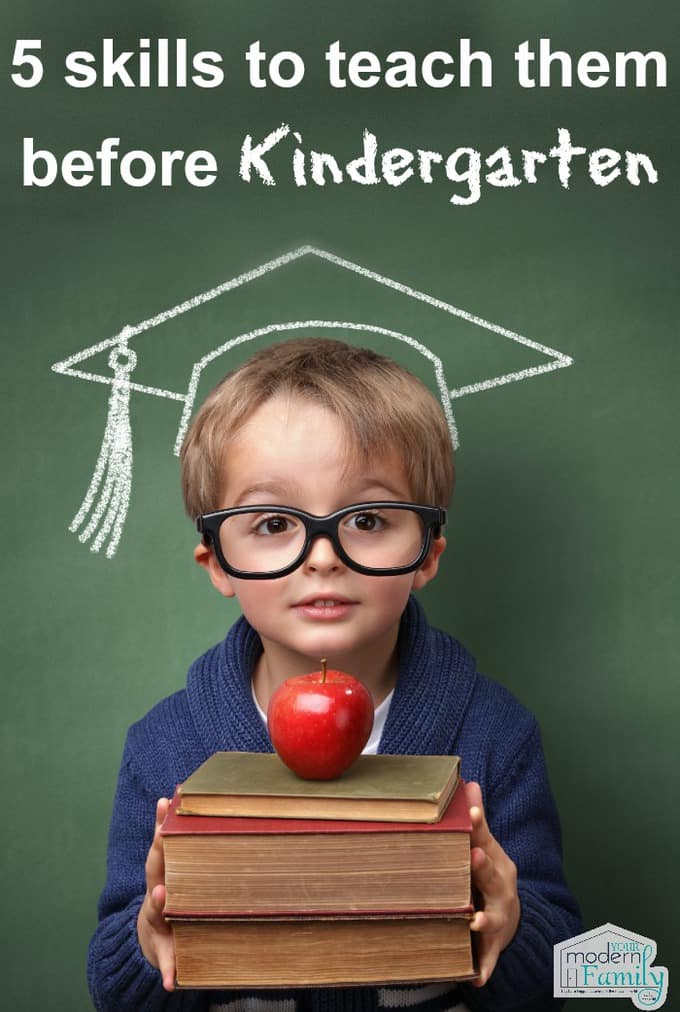
Is your child ready for Kindergarten? Today we’re going to talk about it! I’m sharing a Kindergarten readiness checklist – for life skills! I was a teacher and I saw many things that I wish my students had known before coming to Kindergarten – and I’m not talking about Kindergarten Sight Words.
While they aren’t mandatory, these five things your kid should know before starting Kindergarten can certainly help your child to feel more independent.
5 Non-Academic Skills to Help Your Kindergartener
As a teacher myself, I’ve been lucky enough to see things from a teacher’s side, as well as from the side of the parent. I know that Kindergarten teachers in every school district are always willing to help young children. They guide them on the first day of school and beyond, without question, but teaching your child these things will help them to be more confident in this new setting.
Parents can get a head start & teach these skills as their child is getting ready for Kindergarten. It’s a great way to help your child to feel more confident & comfortable in their new class. 🙂
*Note: Before you begin reading, you should know this is not an academic skills post.
I have many Kindergarten posts on this blog (and Pre-Kindergarten posts) where I share ideas about everything from what you need on the first day to a Kindergarten Sight Word Bundle, but this one is more about teaching your child independence and self-help skills.
How to prepare your child for Kindergarten:
Five things to teach your child before Kindergarten
There comes a time when we are all ready to send our little ones to Kindergarten & we want to know if they are ready for Kindergarten. We want to prepare them and guide them before we send them.
I waited an extra year to send ours (you can see why I decided to “red-shirt” my kids here), but now it is almost time to send our second child to Kindergarten. And this list of five skills to teach your child before kindergarten helps them get prepared for success from Day 1.
These things may seem little to you, or not important, but I can tell you that for your child, they are HUGE when getting your child ready for Kindergarten. As a teacher, play therapist (working with a child aged birth to five years), and parent, I can tell you that they matter.
5 things to teach your child before Kindergarten with our Readiness Checklist
These life skills will give your child confidence and they show the teacher that your child is ready and independent. They will be excited to take on Kindergarten!
Remember… It’s the little things that give your child that feeling of success and leadership.
1. TEACH YOUR CHILD HOW TO TIE THEIR SHOES.
This is not as hard as you think. Just let your child practice it in steps.
- For a few days, teach them to do the X and go through the first loop (the easy part).
- Do this over & over.
- Let them tie everything (cushions on chairs, your shoes, aprons, etc…).
- Next, move on to the rest of the tying process (past just making the X).
Yes, they will get frustrated…that is a given. Don’t panic if they don’t pick it up quickly because every child is different. Three out of our four kids became frustrated when learning, but with a little encouragement, they catch on.
I know that each child is different (some kids want to practice for two minutes a day… while others can master this new skill in 30 minutes) so just be patient and helpful. It took all of our kids about a week.
They were so proud of themselves (our kids had me take a video of them tying their shoelaces to send it to their Dad at work and to their grandparents.) Remember that when you want to jump in and tie it for them, when you are in a rush, or you see your child struggling, you need to STOP doing that for your kids.
From a teacher’s perspective – these things take away so much classroom time. If I had a penny for each shoelace that I tied when I taught…I would be RICH!! 😉
2. TEACH YOUR CHILD TO OPEN A JUICE BOX (or bag of chips, or whatever else is in their lunch box.)
Yes, it’s strange, but you’ll soon understand why it’s on this list.
To be honest, I RARELY send my kids with juice boxes in their lunches, because they drink water with their lunch, but parties and celebrations in schools make this one of those little things that are happening more & more often.
When I taught, I felt like I opened 27 juice boxes on those days (birthdays happen quite often in a classroom with 20+ children).
How do you teach a child to open a juice box? Step-by-step.
- Take the straw off of the juice box, carefully, so it does not crack.
- Open the straw & put the paper in your lunchbox or on your tray.
- Insert the straw into the juice box, without squeezing the juice box.
- Drink the juice and then set it down and wait until you are finished with your lunch.
- Throw it all away (do not wait for the teacher to come by and get it).
These directions seem to be easy enough, right? There are many 5 and 6-year-olds that do not do this because no one has taught them how. It is one of those skills that we just assume they will know when the time comes, but it’s actually one that needs to be taught.
While you are at it, you might want to teach them to open a bag, too (bag of candy, dried fruit, a bag of chips, etc… then when they get these special treats a school, they will be able to help themselves, their teacher, or a friend).
3. TEACH YOUR CHILD HOW TO USE THE BATHROOM, WASH THEIR HANDS & BUTTON THEIR PANTS without help.
Again, easy enough. If your child can’t button their pants without help, you might want to send them in different pants. Most kids do not want to walk out, in front of 25 fellow students, to ask their teacher to button their pants. Practice, practice, practice, to avoid your child being embarrassed.
4. TEACH YOUR CHILD HOW TO HANDLE GETTING WHAT THEY NEED.
You want your child to take responsibility for him or herself.
Think about if your child breaks their pencil in class. Will they know that they need to raise their hand to get another one? Or will they sit there, doing nothing, because they don’t know that they need to take care of themselves?
If they are lost while trying to find a page, will they sit there and continue to turn the pages, or will they ask for help?
One day our son came home, only a few days after entering Kindergarten, and told me that he didn’t eat his yogurt at lunch that day because I didn’t pack him a spoon.
I said, “Don’t they have spoons in the cafeteria that you could have used?”
The look he gave me told me the answer: He had no idea he could go to the cafeteria to get silverware. He never even asked his teacher for help.
I went on to explain that if I forget to pack a spoon (or napkin or a straw), he needs to get up, get into line (or go right to the spot where they keep these things), and take care of his needs. No one is going to do it for him.
Remember, you are raising your child to be a responsible adult. This is a step in that direction.
5. KNOWING THE BASICS (name, number, address)
Does your child know their name, phone number, or address?
These are IMPORTANT and I encourage you to work with your child to learn them while you are getting them ready for Kindergarten!
You are relying on adults that have 24+ other students that day. While I’m sure that our kids will be safe, I still make sure that they know these things. I would never want to send our little ones out ‘into the world without this information.
Oh, and this means knowing their LAST NAME, too, in case a teacher asks, “What’s your last name?” Teach them how to say it and how to spell it.
Here is a little trick that I used to teach our kids their last name (spelling), phone number, and address.
If your child doesn’t know this, slip a piece of paper in between their sock & their shoe with the info on it. This is what I do when we go out somewhere with a lot of people, like an amusement park… and the kids know to look for it there, in case they “forget”.
TIP: Teach your child to memorize your phone number with this idea from my brother!
What About Academic Kindergarten Readiness?
Academic Kindergarten readiness is important too! The wonderful thing about Kindergarten is that they will learn everything that they need to know when they are there. However, giving your child a foundation at home is a great way to help your child be confident, prepared, and feel like they have a solid grasp on what they are learning.
If you are ready to help your child academically, I suggest using this Kindergarten Sight Word Bundle.
This printable packet is easy to use – you can download it and print it over & over to help your child. Teaching Kindergarten Sight Words are so important!
The kids love it & they learn so much from the repetition of seeing the same words again & again. It’s a great way to help your child learn their sight words, which helps them to learn to read well.
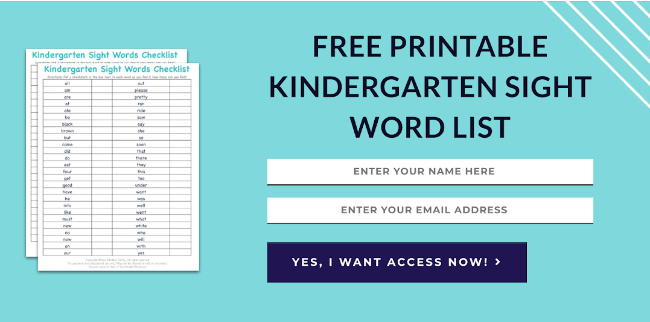
You are welcome to download this free Kindergarten Sight Word List here.
Also, be sure that you are reading to your preschooler & Kindergartener. Read, read & read again. It’s so important.
Kindergarten is an exciting time and I’m sure that your child’s teacher will have a blast teaching your little ones! Use this Kindergarten readiness checklist of life skills to get your little one prepared, and enjoy the journey of Kindergarten with your child!
Ps- Don’t be afraid to check in on your child while they are in school by volunteering or sending your child’s teacher a weekly email at first.
Often, teachers will ask for help from an adult who can attend class during the day to offer a hand, or even attend another class to help a different teacher.
Most teachers like parent volunteers. You can often choose to volunteer weekly or you can sign up for parties: help out on multiple dates or bring the supplies. I have done both.
When our younger kids were too young (infants – ages birth to 12 months) it was hard to go to school, so I helped out by cutting out shapes, organizing papers, or sending in supplies. Here are more ideas on volunteering when your have young children.
MORE KINDERGARTEN POSTS YOU MIGHT LIKE:
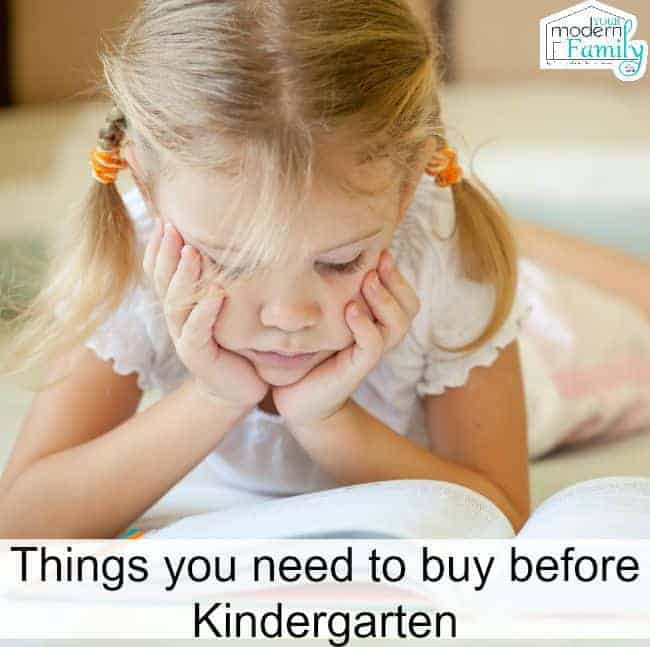
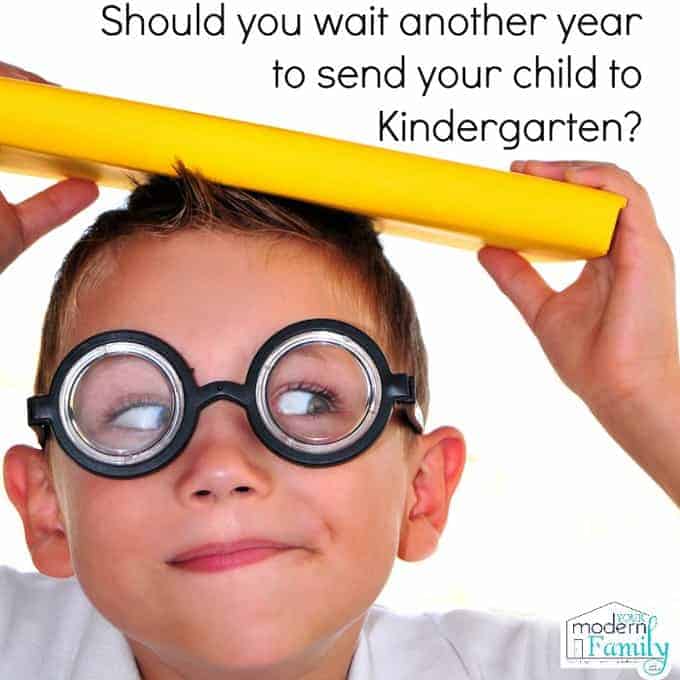
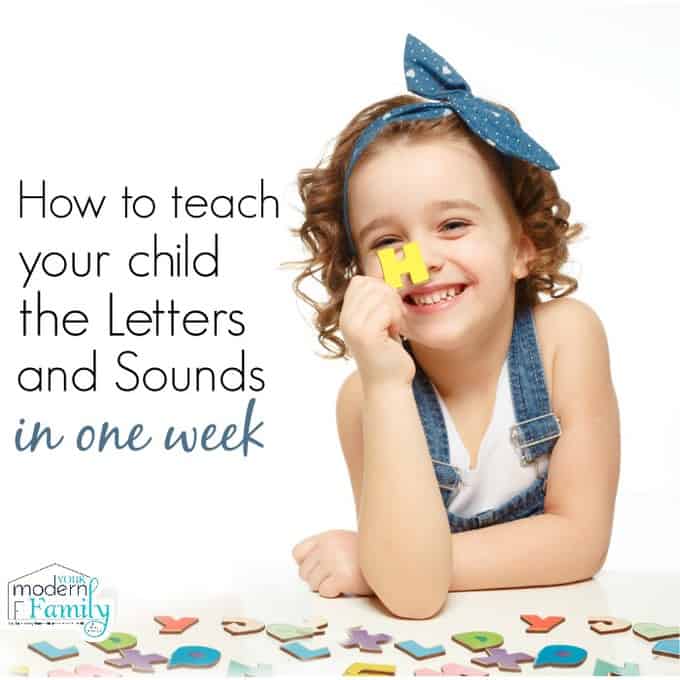
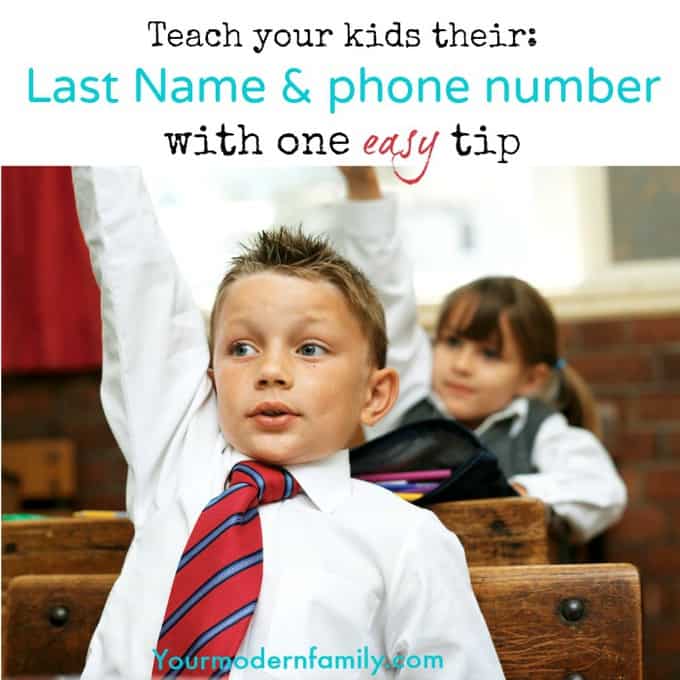
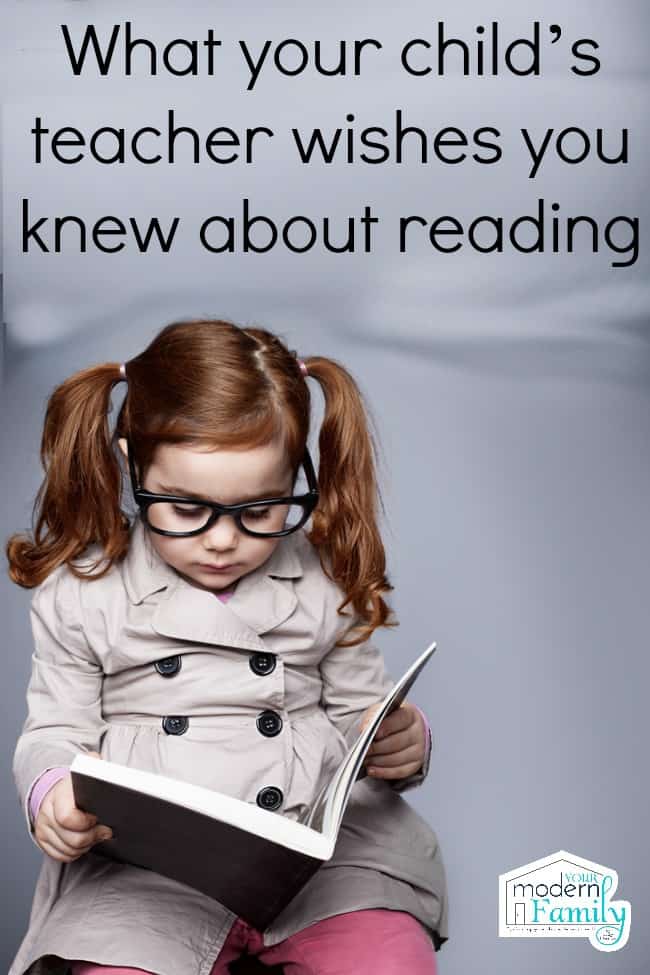




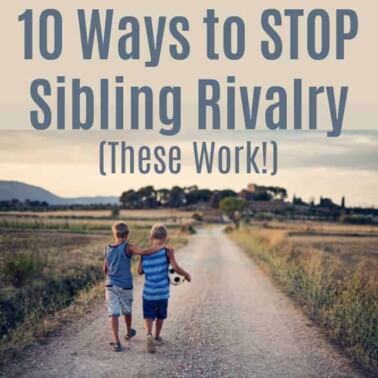









This was a pleasant surprise. I wasn’t expecting this stuff to be on the list but I totally agree. This stuff goes a long way. Good job!
Thanks, Lauren! 🙂
What are the basics I can teach my 3 year old child before I put him in creche in 2015 he will then be 4 years?
I would do letters, numbers & how to write his letters & his name. 🙂 (They will teach him this in K, but I feel like its best to know these going in…) 🙂
I have a 20 Month old cousin and he already know his full alphabet and can recognise and pronounce all the letters in capitals and small, he sings his ABC song very well on his own. He can also recognise and count the numbers from one to ten. So by the time he goes to Kindergarten I am sure he will be reading and writing.
haha! I teach our kids their letters at 18 months by putting on The Letter Factory for car rides. It works like a charm & in only about a week! We LOVE it!! 🙂
Great tips
I would also suggest writing their name, counting to at least 20, rhyming….just to name a few more…
Good ideas!
Very helpful ideas! I’ve got one going to Kindergarten in a year, so we’ll be working on these things. Thank you for sharing. Pinning it now. 🙂
Thanks!
Also teach them not to tattle. That is part of taking care of themselves and others. Tattling does not solve any problems, it just makes more problems. It is a form of disrespect to self and others.
So true.
Teach them the difference between tattling and standing up for either themselves or someone else when bullying is involved. There are 5 and 6 year olds who think it is OK to hit other children just because they are allowed to at home. If it doesn’t involve someone hurting someone either physically or verbally then, they need to mind their own.
As a reading teacher, I have seen far too many kids not even know what a book is. Love your ideas for knowing basic self-help skills but families NEED to take the time to read together, sing songs, enjoy Nursery Rhymes again. Those skills will help them to learn rhyming and enjoy language which will help them learn to read easier. But please, put a BOOK in their hands even as soon as they can grasp something. Biggest help ever!
Love your posts but am having trouble with some of your links. This one isn’t working for me: https://www.yourmodernfamily.com/age-appropriate-chores-for-kids/ and the one for sight words isn’t working either.
Thanks!! I just moved hosts, so I’m glad that you told me. 🙂 I’ll let them know.
For boys, make sure they know what a urinal is and how to use it! Single mom families may not have encountered one…
So smart!
Ironically I just told my daughter she needs to learn to tie her shoes. This is a great list…with great links to other activities!
These are good tips for kids to know before kindergarten.
Thank you for stopping by the Thoughtful Spot Weekly Blog Hop this week. We hope to see you drop by our neck of the woods next week!
Thanks so much for sharing with Wednesday’s Adorned From Above Link Party.
Debi @ Adorned From Above
This is awesome – thank you! I made sure to get drink bottles the kids could open and close on their own. We need to work on number 4 though.
Pinned!
Thanks for linking up at Wordy Wednesday!
haha! 🙂